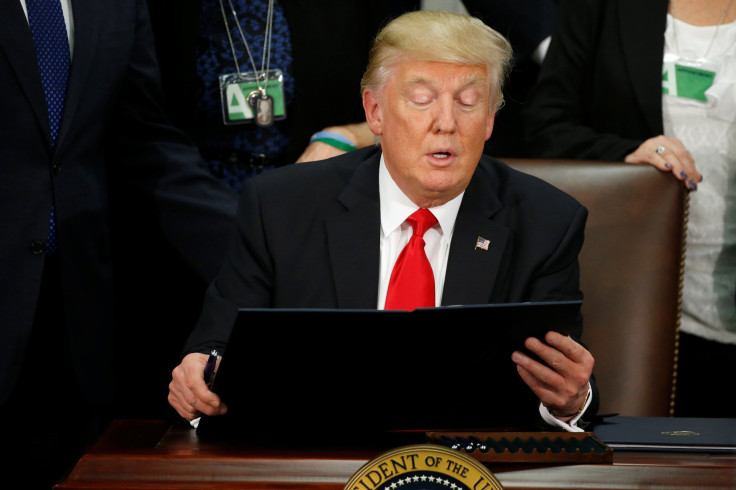Where Does Trump Get His Info? President Won't Read 'Dishonest' Media, Declines Intel Briefings, Yet Cites A German Golfer's Friend

President Donald Trump provided some background this week on how he came to believe the patently false claim that there were millions of illegal votes in November's presidential election, a belief he has not publicly supported with any evidence. His assertion that up to 5 million immigrants illegally voted in November's election was based, so it seems, on a story a German professional golfer told him about long lines at the polls.
Bernhard Langer, a 59-year-old former Masters champion, was in a line at a polling place in Florida and was told he couldn't vote, the president told lawmakers at a private luncheon, the New York Times reported Wednesday. Standing in the voting line both in front and behind Langer were voters who did not look like they should be voting, the president said, before listing names of Latin American countries that the people could have been from. Langer, Trump said, was turned away from voting, while the others in line were given provisional ballots.
The White House later told the Times that the story was actually about a friend of Langer's, and that Langer had simply relayed the story to Trump. Langer is not a U.S. citizen and therefore cannot vote.
But Trump's preference to accept Langer's friend's claims over evidence provided by multiple news outlets and the independent research groups is consistent with previous assertions he has made in recent years and further confirms the strained relationship he has with the mass media.
Many presidents have had adversarial relationships with the press, and many have accused the press of bias on one issue or another. Though Trump reportedly had subscriptions to the New York Times and the New York Post when he lived in Trump Tower, he has largely sought to discredit the entire media apparatus while on the campaign trail and since the election. Trump has been openly hostile to reporters, calling out individual reporters at his rallies, mocking a disabled reporter, and calling a CNN reporter "fake news" during his first post-election press conference.
"They are among the most dishonest human beings on Earth," he said about the press during a visit to CIA headquarters Saturday.
Trump has walked back his post-election criticism of the intelligence community after it released assessments of Russia's role in election hacking. At Langley on Saturday, he blamed the media for his attacks on the intelligence community, claiming "there is nobody that feels stronger about the intelligence community and the CIA than Donald Trump." But Trump doesn't seem to feel strong enough about them to listen to them every day. Trump has said he doesn't need the daily intelligence briefings given to his predecessors.
“You know, I'm, like, a smart person. I don't have to be told the same thing in the same words every single day for the next eight years. Could be eight years — but eight years. I don't need that,” Trump told "Fox News Sunday" in December. “But I do say, ‘If something should change, let us know.'"
President Barack Obama would later respond to Trump's comments by saying "It doesn't matter how smart you are... If you're not getting their perspective, their detailed perspective, then you are flying blind."
Books are another method of learning about the world that Trump doesn't seem to have time for. Even presidents who were known as men who valued action over contemplation were voracious readers. George W. Bush had a reading contest with Karl Rove and read 86 books between 2006 and 2008. Teddy Roosevelt reportedly read a book a day while president. But in spite of the fact that Trump is credited as an author on more than a dozen books, he told the Washington Post he doesn't have time to read.
“I never have. I’m always busy doing a lot. Now I’m more busy, I guess, than ever before," Trump said.
So where does the commander-in-chief get his information, aside from aides and advisors?
His campaign press secretary Hope Hicks told GQ magazine Trump largely relies on Google News printouts. In December, Buzzfeed analyzed Trump's tweets to see what sources of information he was tweeting out, finding that "Trump's favorite information source appears to be Twitter itself." Almost half of the hyperlinks shared by Trump on Twitter during the campaign came from Twitter URLs, Buzzfeed said.
Trump has also looked to alternative news sites. On the campaign trail, Trump claimed the father of Sen. Ted Cruz of Texas was with John F. Kennedy’s alleged assassin Lee Harvey Oswald shortly before the 1963 shooting -- a story that originated from the National Enquirer tabloid. He also referenced news from Infowars, an outlet that has promoted conspiracy theories.
But by his own admission, where Trump seems to get most of his information is television. On "Meet the Press," he told host Chuck Todd that he got military advice from "the shows."
"I mean, I really see a lot of great — you know, when you watch your show and all of the other shows, and you have the generals," Trump said.
He seems to mainly tune into morning weekday news programs. Axios reported on Tuesday that Trump watches "Morning Joe" and "Fox & Friends" back to back most mornings, claiming those programs usually provoke his tweets.
© Copyright IBTimes 2025. All rights reserved.






















